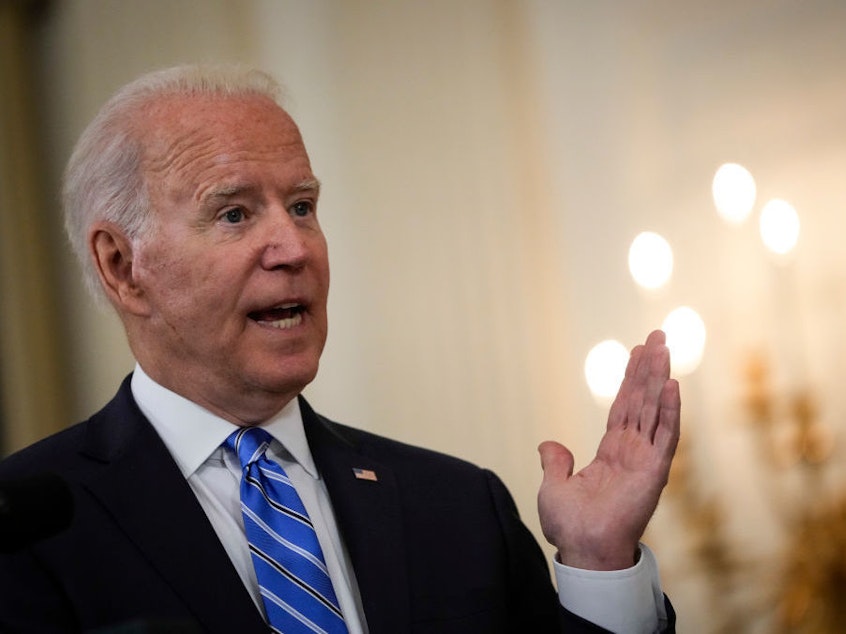Biden Hopes To Jolt COVID Vaccination Rates By Focusing On Federal Workers

President Biden is set to announce new COVID-19 vaccination and testing rules for federal employees Thursday afternoon.
The administration is hoping to increase vaccinations as the highly transmissible delta variant takes hold. But beyond urging Americans to get the shot and trying to expand access to the vaccines, the president has limited ability to force action.
Except when it comes to the federal workforce. Here, Biden has the ability to go beyond urging.
He is expected to announce that federal employees will need to confirm they are vaccinated — or face regular testing and be required to wear masks at all times while on the job. The federal government is one of the largest employers in the nation, and the move could spur private sector companies to take similar steps. Some already have.
The move comes as the Centers for Disease Control and Prevention changed its mask guidance for Americans, urging even people who are vaccinated to wear masks indoors in places with high virus transmission.
Sponsored
It's a big shift from the Fourth of July celebration Biden held to mark a measure of "independence" from the virus. At the time, he lauded fresh efforts to reopen the country.
Back in May, when the CDC abruptly lifted its universal mask mandate, Biden called it a "great day." His administration eagerly embraced the relaxed guidance, with big indoor, maskless events.
Now the country is in a "backslide" — and that's hard, says David Axelrod, a senior adviser to former President Barack Obama and current director of the Institute of Politics at the University of Chicago.
"You know we were building, building back to normalcy and this is a backslide and it's very dispiriting and it's hard to tell people, actually we're going backward instead of forward, at least for now," he said.
The back and forth from the CDC amounts to whiplash and struck many as arbitrary.
Sponsored
"They got a good grade, probably an A in terms of biological science, when they came out with some of those recommendations, but they got an incomplete at best on behavioral science," said Saad Omer, director of the Yale Institute of Global Health.
It's unclear how the CDC's actions could impact Biden politically, but the president has tied his own messaging to the agency and regularly stressed the idea of following "the science" rather than exerting political influence over big decisions.
Generally, Biden gets fairly high marks for his handling of the pandemic, but as next year's midterms close in, there's less room for error.
Democratic pollster Cornell Belcher notes that the current pandemic wave is driven by areas with low vaccination rates.
"If you could connect that back to Biden and his action or inaction, I think that's problematic. But I don't think you can," Belcher said. "I think it's hard to connect the dots around what's happening with the unvaccinated, particularly in the red states."
Sponsored
Still, it will be important for Biden to make sure schools open in the fall and the economy continues to improve. Democratic consultant Karen Finney, who has experience with crisis communications, says the White House has to keep being transparent about what's happening with the pandemic as conditions change, while not letting that overtake the rest of Biden's agenda.
"Keep moving on the things you can control. Keep moving on making sure that the campaign promises are met," Finney said.
As far as what the administration can control, the federal workforce certainly falls in that category. [Copyright 2021 NPR]



